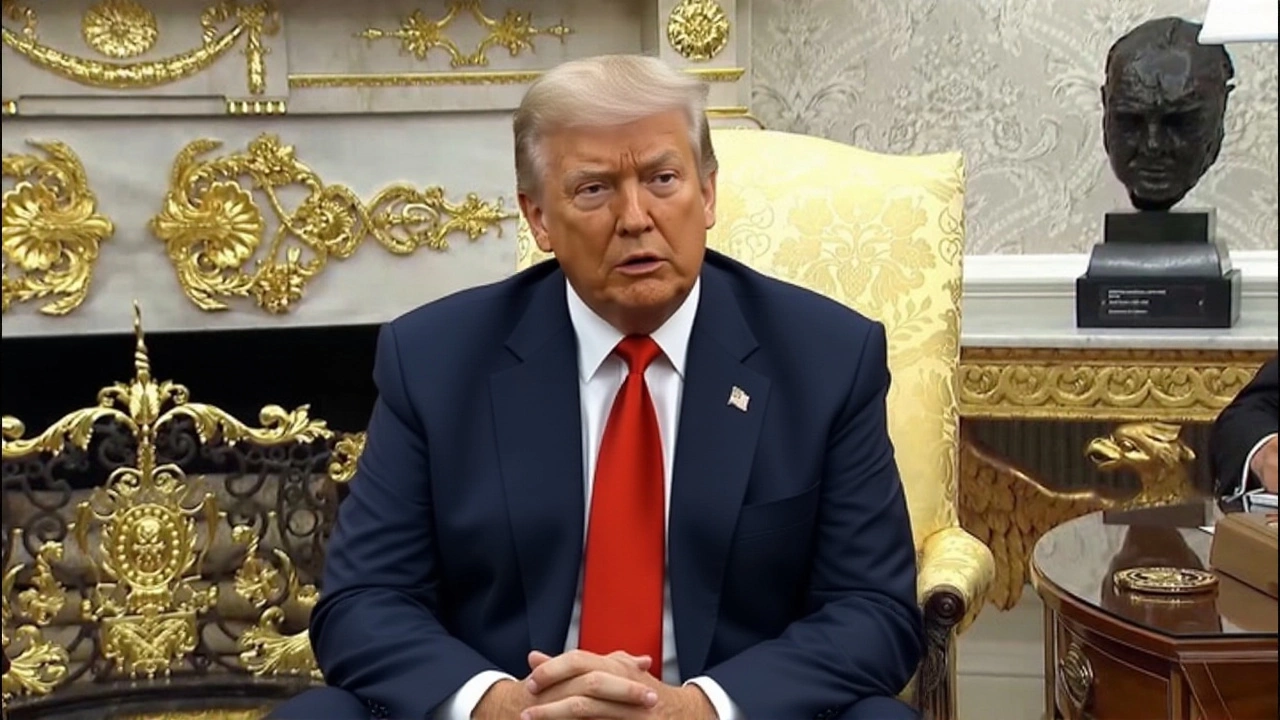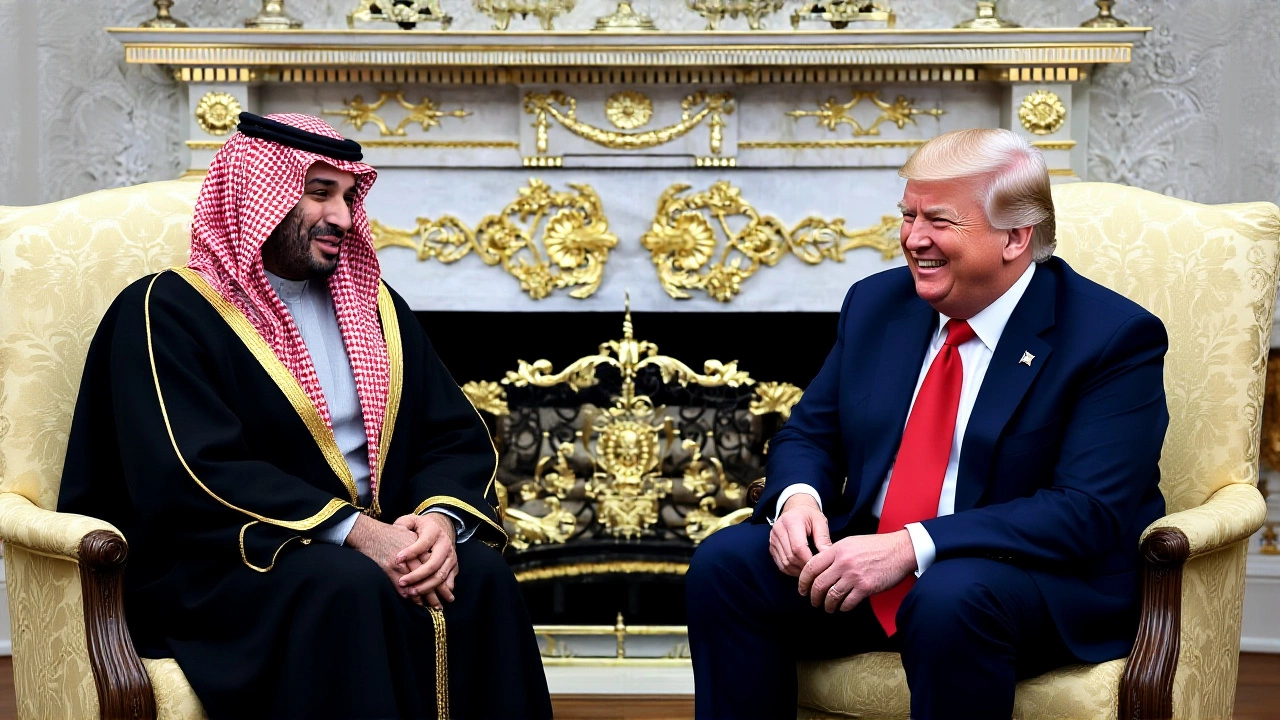Khashoggi Widow Slams Trump for Defending MBS After Years of Silence on Murder
 Nov, 21 2025
Nov, 21 2025
When Hanan Elatr Khashoggi sat down with Reuters on November 19, 2025, she didn’t just speak as a grieving widow. She spoke as a woman whose life was shattered the same day her husband was dismembered inside a Saudi consulate. Her words, recorded at 0:138 in the video, cut through decades of diplomatic silence: "Basically they killed Jamal and they killed me in the same day they killed Jamal." The occasion? A White House meeting between Donald Trump and Muhammad bin Salman — the Saudi Crown Prince U.S. intelligence says ordered the 2018 killing of her husband, Jamal Khashoggi.
"A Lot of People Didn't Like That Gentleman"
During the closed-door meeting in Washington, D.C., Trump was asked about Khashoggi’s murder. His response, captured on video and later transcribed by Reuters, was chilling in its casual dismissal: "He was extremely controversial. A lot of people didn't like that gentleman." The statement came just hours before Khashoggi’s widow publicly broke her silence — a silence that had lasted seven years.
It wasn’t just the words. It was the timing. The meeting occurred on the seventh anniversary of Khashoggi’s murder — October 2, 2018 — a date that still haunts human rights advocates. The CIA and other U.S. agencies had concluded in November 2018 that bin Salman personally approved the operation. A 15-member Saudi hit squad lured Khashoggi — a Washington Post columnist and vocal critic of the Saudi regime — to the consulate in Istanbul under the false pretense of paperwork for his upcoming marriage. Inside, they strangled him, dismembered his body, and dissolved the remains in acid.
"They Destroyed My Life"
"His justification for the crime upset me — nothing justifies a terrible crime," Hanan told Reuters. Her voice, steady but raw, carried the weight of years spent fighting for justice while the world moved on.
She revealed that her Saudi lawyer — the only person in her country willing to represent her — remains imprisoned. "I did not get an official apology. I did not get financial compensation. In fact, they destroyed my life." She added, with quiet fury, that the Saudi government had never acknowledged its role in her husband’s murder. Independent media, including Reuters, could not verify whether any compensation had been paid, but the absence of any public acknowledgment from Riyadh speaks volumes.
Her grief isn’t abstract. It’s legal, financial, emotional. She’s an Egyptian-American citizen who married Khashoggi in 2017, just a year before his death. She was 38. Now, at 45, she lives in exile, her identity tied to a crime that remains unpunished at the highest levels.

Trump’s Defense, and the World’s Complicity
Le Monde, citing its own sources, reported on November 20, 2025, that Hanan specifically called Trump "misinformed" — not because he didn’t know the facts, but because he chose to ignore them. The White House and Saudi government both declined to respond to repeated requests for comment. That silence isn’t accidental. It’s strategic.
Trump’s remarks echo his 2018 response: "I don’t want to lose the Saudi deal." Back then, he dismissed the CIA’s assessment as "not conclusive." Now, seven years later, he’s not just dismissing — he’s defending. And in doing so, he’s signaling to autocrats around the world: kill a journalist, and if you’re powerful enough, you’ll get a handshake in the Oval Office.
It’s not just Trump. The Obama administration avoided naming bin Salman directly. Biden, in 2021, declassified the intelligence but stopped short of sanctioning the Crown Prince. The U.S. has continued arms sales to Saudi Arabia, even after the murder. The $110 billion arms deal signed in 2017? Still active.
The Trial That Wasn’t
The Saudi government held a trial in Riyadh in December 2019. Eleven men were prosecuted. Five got death sentences — later commuted to 20-year prison terms in 2021. Six were acquitted. None were senior officials. No one was charged with ordering the killing. Amnesty International called it a "sham." Human Rights Watch said it was designed to "protect the powerful."
Meanwhile, Hanan’s lawyer — the one who dared to represent her — sits in a Riyadh prison. Her case? Officially ignored. Her voice? Silenced by state power. And now, the man who once praised bin Salman as a "reformer" is standing beside him in the White House, calling her husband "controversial."

What Comes Next?
There’s no indication the U.S. will reopen the case. Congress has tried — repeatedly — to pass legislation holding Saudi leadership accountable. Each time, it’s stalled. The Senate voted in 2019 to end U.S. support for Saudi operations in Yemen — a direct response to Khashoggi’s murder. Trump vetoed it.
But Hanan isn’t done. She’s now speaking to international media again. She’s working with a legal team in The Hague. She’s not asking for revenge. She’s asking for accountability. "If they can welcome him," she said, "then they’re saying it’s okay. And that’s the worst part."
What’s happening here isn’t just about one murder. It’s about whether the world still believes in justice — or whether power always wins.
Frequently Asked Questions
Why didn’t the U.S. punish Muhammad bin Salman for Khashoggi’s murder?
Despite U.S. intelligence conclusively linking bin Salman to the 2018 killing, no sanctions were imposed on him personally. The Biden administration declassified the report in 2021 but avoided direct punishment, citing "strategic interests" — including oil, counterterrorism cooperation, and military contracts worth over $100 billion. The U.S. has never charged a foreign head of state with murder, and political expediency has consistently outweighed moral accountability.
Has Hanan Elatr Khashoggi received any compensation from Saudi Arabia?
There is no public record of financial compensation paid to Hanan by Saudi authorities. While Saudi officials have hinted at "private arrangements," no official documents or court filings confirm this. Reuters and other independent outlets have been unable to verify any payment. Hanan herself has repeatedly stated she received nothing — not even an apology — and her legal team in Saudi Arabia remains imprisoned for representing her.
What happened to the 11 Saudis convicted in the Khashoggi trial?
Five defendants received death sentences in 2019, but those were commuted to 20-year prison terms in 2021 after the victims’ families "forgave" them — a legal maneuver under Saudi law that effectively shields higher-ups from accountability. The other six were acquitted. None were senior officials. The trial, held behind closed doors, excluded international observers and failed to name bin Salman as a suspect — despite the CIA’s conclusion that he personally approved the operation.
Why does Trump’s defense of MBS matter now?
It signals a dangerous normalization of state-sponsored violence. If a U.S. president can publicly downplay the murder of a journalist — especially one who worked for an American newspaper — it emboldens other authoritarian regimes to silence dissent without fear of consequences. It also undermines the credibility of U.S. human rights policy. When leaders who order killings are welcomed as allies, the moral authority of the West erodes.
Is there any legal path left for Hanan to seek justice?
Yes — but it’s long and uncertain. Hanan is working with a team of international lawyers exploring cases under the principle of universal jurisdiction, potentially in Belgium, Germany, or at the International Criminal Court. The challenge? Saudi Arabia doesn’t recognize these courts. Still, precedent exists: German courts convicted a former Syrian official for torture in 2022, even though Syria wasn’t a party to the court. Hanan’s case could become a landmark in holding heads of state accountable for crimes against journalists.
How has the international community responded to Trump’s remarks?
Reactions have been sharply divided. European Union officials issued a quiet statement reaffirming "the importance of press freedom," while Canada and the UK declined to comment publicly. Turkey, where Khashoggi was killed, called the remarks "unacceptable." Human rights groups, including Reporters Without Borders and the Committee to Protect Journalists, condemned Trump’s comments as "a betrayal of journalistic values." But no country has threatened sanctions or recalled ambassadors — underscoring how economic ties continue to silence moral outrage.